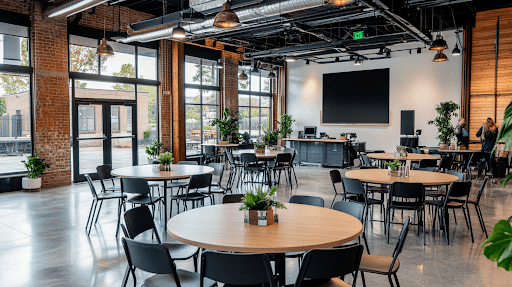Event planning goes beyond simply organizing schedules and logistics—it’s about crafting experiences that leave a lasting impact. To pull off a successful event takes more than just a checklist; it requires a blend of key skills that bring ideas to life, manage unexpected challenges, and engage attendees.
Whether you’re a seasoned professional aiming to refine your skills or someone stepping into event planning for the first time, developing a strong foundation in these essential skills can make all the difference.
In this article, we’ll explore the core event planning skills that help you stay organized, creative, and adaptable, setting you up to coordinate and deliver events that leave a memorable impression on every guest.
Gain valuable insights into live event planning with our article, 'Live Event Planning: The Complete Guide to Hosting Successful Events.'
What Are Event Planning Skills?
Event planning skills are the abilities that help organize, coordinate, and execute successful events. These skills include both soft skills, like communication and problem-solving, and hard skills, such as budgeting and timeline management.
Together, they equip event planners to handle everything from scheduling and logistics to creating memorable experiences that connect with attendees and meet event goals.
Strong event planning skills are essential for managing the details, adapting to changes, and ensuring each part of the event runs smoothly.
Essential Event Planning Skills
1. Organizational Skills
A strong foundation in organizational skills ensures that event planners can manage multiple tasks, prioritize effectively, and deliver a seamless event experience.
Time Management
Efficient time management allows planners to stay on top of deadlines and juggle multiple responsibilities, from booking venues to coordinating vendors. Structured time management prevents delays and ensures each task receives attention.
Break down tasks with a detailed timeline
Use tools like Google Calendar or Trello to stay organized
Set reminders for critical deadlines
By establishing a clear timeline and utilizing planning tools, event planners can handle each phase without falling behind.
Prioritization
Knowing which tasks to prioritize helps keep the event planning process on track, ensuring important tasks are completed on time while maintaining focus on quality.
Identify critical tasks that impact the timeline
Delegate lower-priority tasks when possible
Reassess priorities as the event date approaches
Prioritizing tasks ensures that the most crucial aspects, like securing a venue, are addressed first.
Attention to Detail
Every small detail, from contract fine print to decor arrangement, contributes to a successful event. Attention to detail enhances the attendee experience and helps prevent last-minute issues.
Develop checklists for each event phase
Double-check vendor contracts for clarity
Review decor and layout details before the event
Checklists and double-checking contracts help minimize oversights, ensuring that no detail is missed.
To encourage further insight into efficient event planning, consider exploring the TOP 6 reasons why professional event organizers use event management software. This resource provides valuable information on how using a single tool can streamline your workflow, save time, and keep every detail organized, making it easier to deliver a seamless event experience.
2. Communication Skills
Clear communication keeps all parties informed, aligned, and motivated throughout the planning process.
Client and Stakeholder Communication
Regular updates to clients and stakeholders build trust and keep everyone aligned with the event’s progress and goals.
Schedule regular update meetings or calls
Provide progress emails to keep stakeholders informed
Establish a communication plan with preferred methods
A structured communication plan fosters transparency, ensuring clients feel engaged and informed.
Team Collaboration
Effective collaboration among team members and vendors is essential for executing an event smoothly. Good teamwork ensures everyone knows their roles and responsibilities.
Assign clear roles and responsibilities early on
Foster open communication to address any issues
Encourage regular check-ins to ensure alignment
Establishing roles and open communication enhances coordination and minimizes confusion.
Clear Instructions
Providing concise and clear instructions reduces misunderstandings, ensuring tasks are executed as planned.
Write detailed instructions for complex tasks
Use visual aids, like floor plans, for clarity
Encourage team members to ask questions
Clear communication ensures that all team members understand their responsibilities, leading to a more efficient setup.
3. Problem-solving, Adaptability, and Tech Savviness
Adaptability, problem-solving, and tech savviness are essential skills for event planners to manage unexpected challenges and leverage emerging trends like AI to create seamless experiences.
Crisis Management
Staying calm and quickly finding solutions in a crisis ensures the event stays on track despite unforeseen issues.
Develop contingency plans for critical tasks.
Conduct role-playing scenarios to prepare the team.
Communicate clearly with attendees during disruptions.
Having contingency plans and practicing responses equips the team to handle unexpected situations effectively, maintaining a smooth event experience.
Flexibility
Being flexible allows planners to adapt to changes in real-time, ensuring the event's quality remains high despite adjustments.
Embrace change and stay open to new ideas.
Adjust schedules to accommodate attendee engagement.
Reallocate resources as needed for better outcomes.
Flexibility enables seamless adjustments to the event flow, ensuring attendees enjoy a well-executed experience.
Decision-Making
Quick and informed decision-making is critical in event planning, especially when tight deadlines or unexpected changes arise.
Gather relevant information to make informed choices.
Use experience to guide decisions.
Weigh risks against potential rewards.
Confident decision-making helps planners navigate dynamic situations effectively and keeps events running smoothly.
Tech Savviness
Tech-savvy planners who embrace emerging tools, such as AI, stand out in the modern event industry. AI can streamline planning, enhance attendee experiences, and provide valuable insights.
Leverage AI tools for tasks like attendee data analysis, personalized recommendations, and chatbots for event queries.
Stay updated on the latest event tech trends.
Integrate new technology into workflows to improve efficiency and engagement.
Flexibility allows for smooth adjustments to the event flow, making the experience better for attendees.
4. Budgeting and Financial Management Skills
Strong budgeting skills help planners create an impactful event while staying within financial limits.
Cost Estimation and Budget Creation
Creating a realistic budget early on helps planners allocate funds where needed and avoid financial surprises.
Establish a baseline budget for essential items
Track spending against the budget regularly
Adjust budgets as needed to cover unforeseen expenses
Monitoring the budget closely helps ensure resources are used efficiently.
Resource Allocation
Allocating resources strategically allows planners to enhance high-impact areas without overspending.
Prioritize areas with the most attendee impact, like food and entertainment
Balance quality with cost by exploring cost-effective options
Reallocate resources based on real-time needs
Focusing on high-impact areas maximizes attendee satisfaction without exceeding the budget.
Negotiation Skills
Negotiation helps planners secure the best rates and value from vendors, maximizing the event’s budget.
Research industry rates to negotiate fair prices
Highlight potential for future partnerships with vendors
Negotiate for value-added services where possible
Effective negotiation helps planners stretch their budget while maintaining quality.
5. Creative Event Concept Development Skills
Creativity adds depth to the event experience, making it memorable and engaging.
Concept Development
Developing a unique concept that aligns with the event’s purpose creates a cohesive theme and engages attendees.
Brainstorm ideas that resonate with the audience
Align the theme with the event’s branding and goals
Create exciting messaging in line with the event brand
Plan activities that support the overall concept
A unique and cohesive theme creates a lasting impression on attendees.
Innovation in Engagement
Finding fresh ways to engage attendees enhances their experience and keeps them invested.
Introduce interactive elements, like live polls or Q&As
Incorporate technology, such as augmented reality, to enhance engagement
Use hands-on activities to keep attendees involved
Innovative engagement techniques make events more dynamic and memorable.
Visualize the Event Flow
Planning from the attendee’s perspective helps create a smooth, enjoyable experience.
Map the attendee journey from start to finish
Arrange venue space thoughtfully for easy navigation
Plan transitions between activities to maintain engagement
Visualizing the event flow from an attendee’s viewpoint ensures a seamless experience.
To enhance your event's engagement and leave a lasting impact, download Your FREE REPORT to Maximise your event impact. This report explores six essential event tech strategies to streamline your planning and boost the attendee experience, making every aspect of your event truly memorable.
6. Marketing and Promotion
Effective marketing attracts the right audience and builds excitement around the event.
Audience Analysis
Understanding your target audience enables planners to tailor the event experience to their interests.
Create detailed attendee personas for different segments
Identify key interests to shape the event’s theme and agenda
Focus on content and activities that resonate with the audience
Audience analysis helps planners create relevant experiences that appeal to attendees.
Social Media and Email Marketing
Using social media and email strategically builds anticipation and reaches potential attendees.
Share pre-event content, such as speaker announcements, to generate interest
Maintain a consistent brand message across platforms
Engage followers with behind-the-scenes glimpses and countdowns
Consistent and engaging marketing efforts ensure higher event attendance.
Building Hype
Generating excitement before the event keeps potential attendees interested and encourages them to register.
Use a countdown to create urgency as the event date approaches
Highlight unique selling points, like special guests or exclusive content
Share testimonials or past event successes to build credibility
Creating hype helps increase attendance and ensures attendees look forward to the experience.
For a complete solution that elevates event visibility and communication, explore Event marketing & communication with Lyyti. This tool helps you create tailored, stylish, and impactful communication plans to engage your audience and enhance your event’s reach.
How to Develop and Strengthen Your Event Planning Skills?
Building strong event planning skills requires a mix of formal learning, practical experience, and staying current with trends. Here are some ways to enhance your abilities:
Earn Certifications: Programs like CMP or CSEP add credibility and structured knowledge.
Gain Practical Experience: Take on various roles and learn from each event.
Stay Updated: Follow industry blogs and attend events to keep up with trends.
Develop Soft Skills: Improve communication and adaptability through networking and practice.
Use Planning Tools: Familiarize yourself with software like Lyyti for efficient event management.
Seek Feedback: Reflect on past events and gather attendee input to improve continuously.
Stay Curious: Keep a growth mindset to adapt and learn over time.
“Mastering both soft and hard skills in event planning is what transforms a basic gathering into an unforgettable experience. These skills are the foundation that keeps every detail aligned with the event’s goals.” — Petri Hollmén, CEO of Lyyti."
Conclusion
Developing strong event planning skills is essential for delivering successful, memorable events and advancing in your career. These skills—ranging from organization and budgeting to creativity and adaptability—create a solid foundation for navigating each stage of event planning with confidence. Focusing on continuous growth and learning helps improve your abilities and opens up new opportunities in the dynamic field of event planning.
To support you in this journey, Lyyti offers tools that simplify and enhance each phase, from initial planning to post-event analysis.
Ready to take your event planning skills to the next level? Book a demo with Lyyti today and see how our tools can empower you to achieve event excellence.
FAQ
What are essential event planning skills?
Essential event planning skills include organization, communication, budgeting, creativity, and adaptability. These skills enable planners to manage logistics, engage attendees, and handle unexpected challenges, ensuring a smooth and memorable event experience.
How can I improve my event planning skills?
You can improve by earning certifications, gaining hands-on experience, staying updated with trends, using event planning tools, and seeking feedback. These methods help you build both soft and hard skills, making you more effective.
Why is creativity important in event planning?
Creativity makes events memorable by designing unique concepts and engaging experiences that captivate attendees. It helps planners develop themes, innovate engagement methods, and create a cohesive event flow that resonates with audiences.
How does Lyyti support event planning?
Lyyti provides tools that simplify each phase of event planning—from guest management and communication to data insights and post-event analysis—allowing planners to work efficiently and focus on delivering impactful events.
Why are certifications valuable in event planning?
Certifications like CMP or CSEP add credibility, and structured knowledge to demonstrate expertise in event planning. They provide formal training in essential skills, making planners more competitive and capable of managing complex events.








